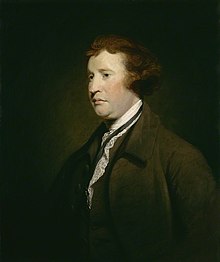Saylor.org's Comparative Politics/Conservatism
Conservatism
[edit | edit source]
Conservatism emerged in response to the rise of liberalism and the liberal challenge to absolutism and social hierarchy based on privilege. Conservatism emphasized a 'natural order' based on tradition and slow evolutionary change. The hierarchical nature of society was seen as part of that natural order, the fitness of the monarch and aristocracy to rule having been 'established' over a long period. Conservatism still tends to resist radical change or attacks on social privilege.
The man considered the founder of modern conservative thought (at least in the English-speaking world) was the English statesman Edmund Burke (1729-1797). Burke, although a supporter of the American revolutionary bid for independence from the United Kingdom, took a principled stand against the French Revolution in his 1790 pamphlet Reflections on the Revolution in France. In his work, Burke compared the course of the French Revolution (only a year old at that point) to Britain's "Glorious Revolution" of 1688. Burke defended national tradition as the basis of governance to the sort of foggy and abstract principles set forth by popular Enlightenment thinkers that also made up France's revolutionary Declaration on the Rights of Man and of the Citizen. By throwing away tradition in favor of these indefinable concepts of rights, the French threw the doors open to ever-increasingly radical interpretations of these rights, Burke argued. Indeed, this point made just a year into the revolution seemed all too prescient a decade later as the Revolution took an ever increasing violent and radical path from the execution of Louis XVI and Marie Antoinette, the reign of Robespierre's Terror and the ultimate coup d'etat and imperial wars of Napoleon Bonaparte. Burke's critique of the French Revolution epitomize the basis of conservative thought: that of a countering force against the push for societal change. The essence of Burke's conservatism, and much of modern conservatism is the belief that it is a cautionary check on the unbridled and sometimes destructive spirit of the pursuit of the new and untried.
American Conservatism
Although in the last thirty years in the United States, 'conservatism' has become almost synonymous with the Republican Party, it was not always like this. For most of its history, the Democratic Party, particularly in the south, was the party of social conservatism. While this began to change with President Franklin Roosevelt, by the Civil Rights legislation of Lyndon Johnson, the parties almost did a complete switch in this regard. Until the emergence of the religious right in the United States and the 'Reagan Revolution,' Republicans came in a variety of shades running from left-of-center to right. What Americans consider 'conservative' in their politics is considered something of a misnomer by much of the rest of the world. What Americans call "conservatism" is called "liberalism" or "neoliberalism" by much of the rest of the world. This is largely because, traditionally speaking, European liberals favored free markets and liberal democracy, as American conservatives certainly do. Conservatives were figures who believed in the authority of the monarchy and avoided liberalized trade and completely free markets. Now, with all of Europe under some form of constitutional, democratic form of government, the main political struggle is not one between conservatives and liberals, as it had been in the 19th century. Rather, with the momentum for traditional authority almost completely gone, Europe witnesses political struggles between "liberals" and numerous shades of social democrats, socialists and communists.
